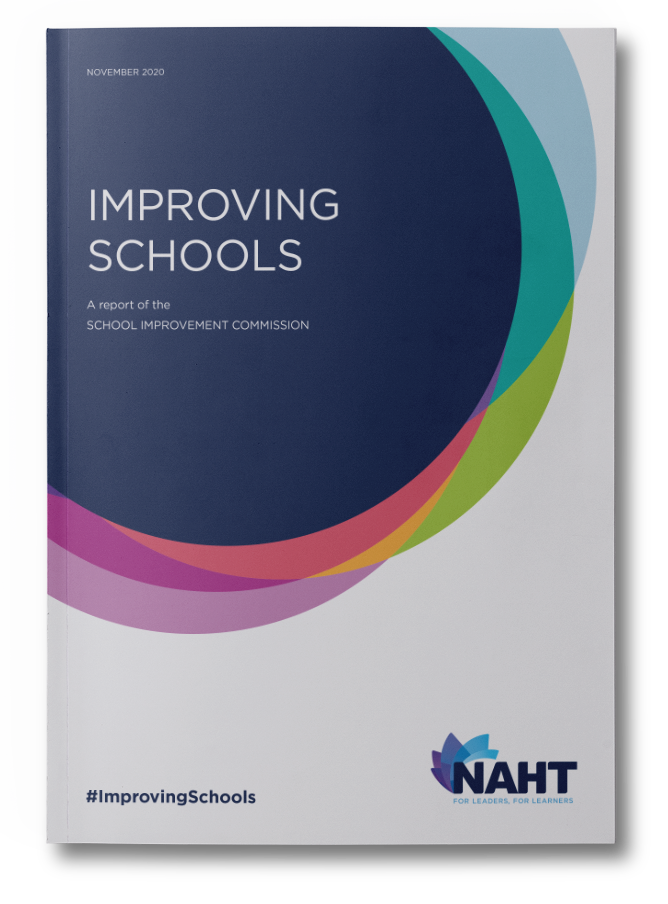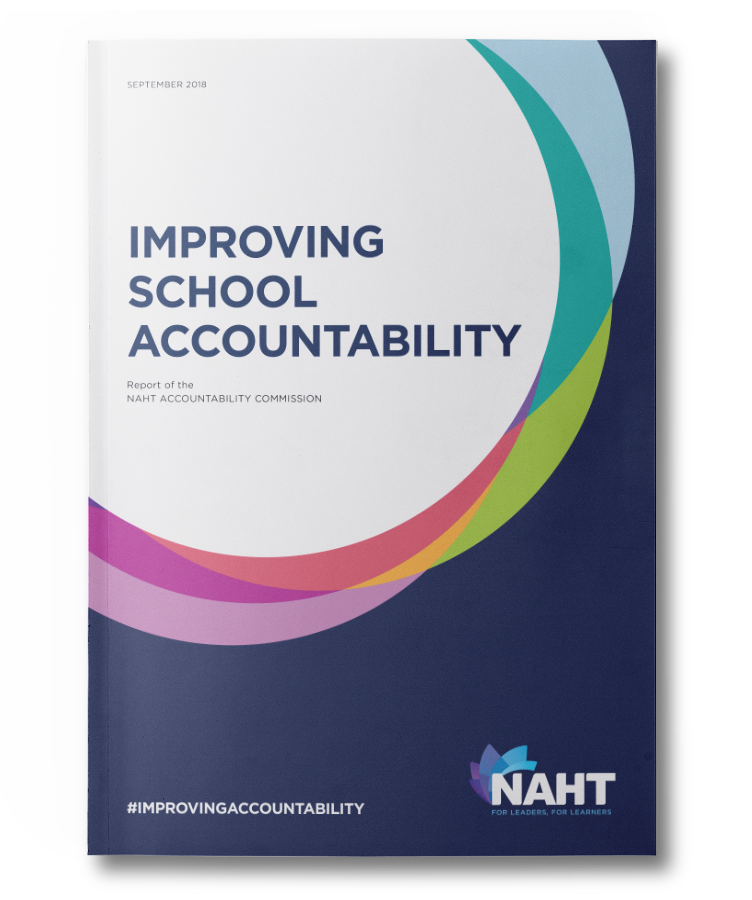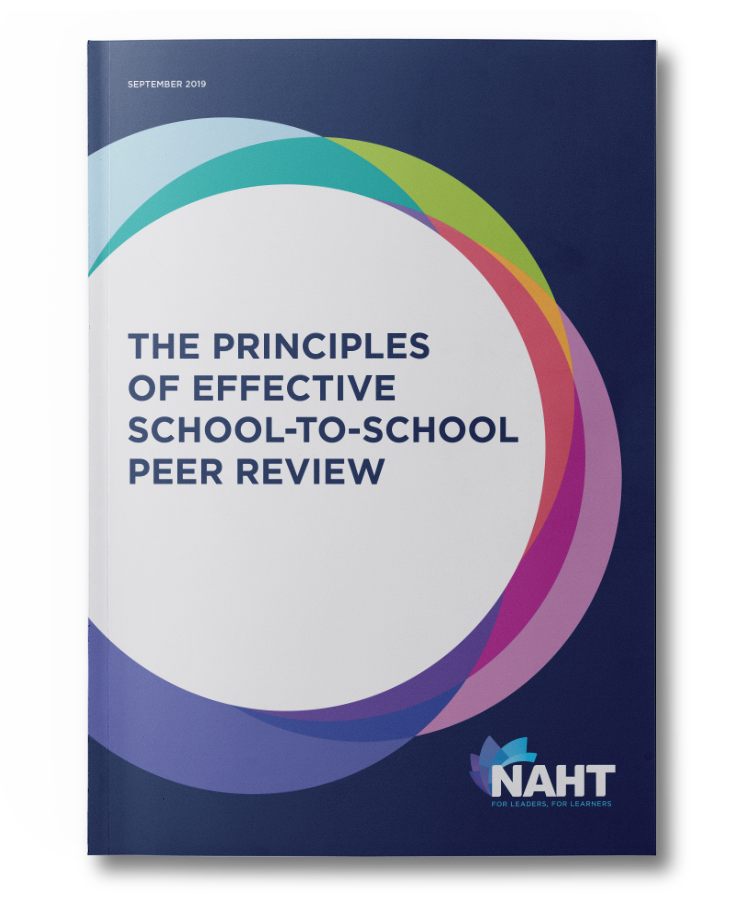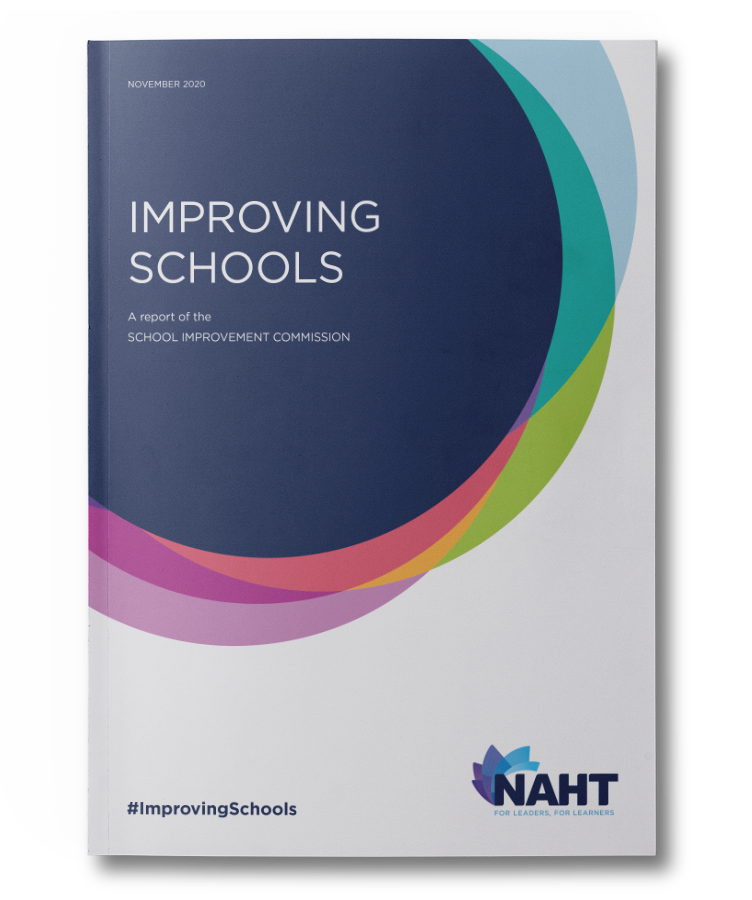Read the full report here.

THE SCHOOL IMPROVEMENT COMMISSION
A message from Nick Brook, chair of the School Improvement Commission
In September 2018, NAHT published the report of the Accountability Commission, Improving School Accountability. The report noted that the quality of education in England had transformed over the last twenty five years and the majority of schools were now good or better. It recognised that accountability arrangements had contributed to this improvement.
However, the commission concluded that arrangements that had lifted the system to good were unlikely to deliver further improvements in the quality of education overall. To improve standards further, and create a truly world-class system, the commission concluded that we should rebalance holding schools to account with helping them to improve.
While there has been clear acceptance of the need for a greater focus on the support schools receive, there has been far less clarity about what that should look like in practice. NAHT therefore agreed to convene a new commission of leading educationalists and academics to provide greater insight on this critical issue. As a starting point, the commission took the output of a roundtable discussion with the secretary of state for education in September 2019, on barriers to effective school improvement.
Our ambition is twofold: that schools which face the deepest of challenges in the most deprived communities are better supported to succeed; and schools that are already good are better supported on their journey of continuous improvement.
This report represents the broad collective view of the commission. Individual involvement in the commission, either as a commissioner or expert witness, does not necessarily equate to support for, or endorsement of, all statements and recommendations made.


THE SCHOOL IMPROVEMENT COMMISSION
A message from Nick Brook, chair of the School Improvement Commission
In September 2018, NAHT published the report of the Accountability Commission, Improving School Accountability. The report noted that the quality of education in England had transformed over the last twenty five years and the majority of schools were now good or better. It recognised that accountability arrangements had contributed to this improvement.
However, the commission concluded that arrangements that had lifted the system to good were unlikely to deliver further improvements in the quality of education overall. To improve standards further, and create a truly world-class system, the commission concluded that we should rebalance holding schools to account with helping them to improve.
While there has been clear acceptance of the need for a greater focus on the support schools receive, there has been far less clarity about what that should look like in practice. NAHT therefore agreed to convene a new commission of leading educationalists and academics to provide greater insight on this critical issue. As a starting point, the commission took the output of a roundtable discussion with the secretary of state for education in September 2019, on barriers to effective school improvement.
Our ambition is twofold: that schools which face the deepest of challenges in the most deprived communities are better supported to succeed; and schools that are already good are better supported on their journey of continuous improvement.
This report represents the broad collective view of the commission. Individual involvement in the commission, either as a commissioner or expert witness, does not necessarily equate to support for, or endorsement of, all statements and recommendations made.

OUR AMBITION:
A SCHOOL SYSTEM OF HIGH EXCELLENCE
AND HIGH EQUITY EVERYWHERE.
In the last twenty five years, education standards have been transformed in England. Accountability arrangements have played their part in this transformation but are unlikely to achieve further improvements in the quality of education. High-stakes accountability is a powerful tool for driving compliance to minimum standards but a poor one for creating excellence within a system. To improve standards further, we need to rebalance holding schools to account with enabling them to improve.
Schools are only as good as the people who work in them. Ultimately, school improvement takes place on a teacher-by-teacher or classroom-by-classroom basis. Our goal is for every pupil in the country to be taught by an expert teacher, with strong pedagogical content knowledge and understanding of how children learn, who belongs to a profession that continually builds its collective expertise.
First and foremost, the role of the school leader is to create the conditions in which teachers can flourish and pupils can succeed. Yet in recent years this simple truth has, at times, become lost as additional responsibilities have become loaded onto the role and accountability pressures have driven activity that has more to do with being Ofsted-ready than improving teaching and learning. Head teachers need the confidence to reassert their role as leaders of learning, ensuring positive cultures exist within schools and, critically, have the courage of their conviction when confronted with pressures for quick wins or faced with shifting goalposts.
Sustainable school improvement takes time, delivered more often through small incremental changes at the classroom level than through ‘big-ticket’ structural changes. The pressure to demonstrate rapid improvement has led to some schools adopting ‘drag and drop’ approaches, where they attempt to copy and apply effective practice from other schools. Emulating the observable features of effective practice without developing the underpinning expertise of teachers and leaders to deliver it will rarely achieve the desired impact. School improvement is not about a top-down, one-size-fits-all process. The commission believes that redefining school improvement away from short-term fixes and a search for magic bullets is important. We believe that a greater understanding of the research, combined with teachers’ professional knowledge of what works in their particular context, is critical to success.
School improvement should be seen as a continuous journey, not a destination to be reached. All too often, school improvement has been defined by the school’s journey through the Ofsted grading structure. A school is seen to have improved when it moves from requires improvement to good then finally outstanding. Our ambition is greater than this – that every single school continues to get better. Regardless of their starting point, they improve on previous best. We should redefine and celebrate the most successful schools as those that are the best at getting better.
School improvement should be a collaborative, collective endeavour, within and between schools, because collaboration enriches teachers’ learning and spreads expertise so that all children can benefit. In some parts of the country, there is a strong sense of place among teachers and leaders, where head teachers believe in and act out their responsibility to the pupils in their schools and every child in their locality. However, the current system encourages and incentivises competition over collaboration and there is too often a sense that school improvement is a ‘zero-sum game’. We need to re-examine incentives and structures within the system to redress this imbalance.
Progress towards a self-improving, school-led system, founded on deep partnerships, co-creation and local solutions has stalled. During the last decade, higher status schools have benefited from opportunities and resources available only to those with top inspection grades. Despite notable exceptions, too often these initiatives have simply reinforced local hierarchies and furthered the creation of winners and losers. Knowledge and expertise around school improvement have become commodities to be sold rather than insight to be shared. Many exceptional leaders are becoming disillusioned by the increasingly limited, transactional nature of system leadership roles such as National Leaders of Education (NLEs). Yet the opportunity to apply one’s professional insight and knowledge to support colleagues should be seen as the pinnacle of a school leader’s career. There needs to be a fundamental change to the role of NLEs, with trust in professional judgement central to this change.
The commission believes that action is urgently required to enhance the quality of life in the most marginalised and deprived areas of our country. There is a wealth of evidence that demonstrates the impact of issues beyond the control of schools that affect the life chances of our young people. Schools with the highest expectations also need their young people to benefit from good health, housing and supportive communities. We believe the work of the opportunity areas is beginning to show promise and we are calling for this policy to be extended, with a sustained commitment beyond annual extensions.
In order to achieve the vision set out above we need a significant shift in culture and policy. This will require change. Change in valuing sustainable improvement over quick fixes. Change in terms of how we educate, develop and support leaders so they can create conditions in which teachers can thrive. Change in terms of improved access to high-quality CPD for all teachers. Change in terms of how we support schools which find themselves in the most challenging circumstances. We have identified what that change might look like and what needs to happen to move closer to our core vision of a continuously improving school system.
We do not need the government to mandate a shift in culture and approach – the power to change the climate resides with school leaders. But in the face of high-stakes accountability, this can take brave and courageous leadership which should not be the case. The government must make the right path the easiest path to choose. They alone have the power and opportunity to remove barriers by aligning accountability measures and incentives. We need schools that are supportive, kind places to work and thrive. Working together, we stand the best chance of further unleashing the potential residing in England’s schools.





OUR AMBITION:
A SCHOOL SYSTEM OF HIGH EXCELLENCE
AND HIGH EQUITY EVERYWHERE.
In the last twenty five years, education standards have been transformed in England. Accountability arrangements have played their part in this transformation but are unlikely to achieve further improvements in the quality of education. High-stakes accountability is a powerful tool for driving compliance to minimum standards but a poor one for creating excellence within a system. To improve standards further, we need to rebalance holding schools to account with enabling them to improve.
Schools are only as good as the people who work in them. Ultimately, school improvement takes place on a teacher-by-teacher or classroom-by-classroom basis. Our goal is for every pupil in the country to be taught by an expert teacher, with strong pedagogical content knowledge and understanding of how children learn, who belongs to a profession that continually builds its collective expertise.
First and foremost, the role of the school leader is to create the conditions in which teachers can flourish and pupils can succeed. Yet in recent years this simple truth has, at times, become lost as additional responsibilities have become loaded onto the role and accountability pressures have driven activity that has more to do with being Ofsted-ready than improving teaching and learning. Head teachers need the confidence to reassert their role as leaders of learning, ensuring positive cultures exist within schools and, critically, have the courage of their conviction when confronted with pressures for quick wins or faced with shifting goalposts.
Sustainable school improvement takes time, delivered more often through small incremental changes at the classroom level than through ‘big-ticket’ structural changes. The pressure to demonstrate rapid improvement has led to some schools adopting ‘drag and drop’ approaches, where they attempt to copy and apply effective practice from other schools. Emulating the observable features of effective practice without developing the underpinning expertise of teachers and leaders to deliver it will rarely achieve the desired impact. School improvement is not about a top-down, one-size-fits-all process. The commission believes that redefining school improvement away from short-term fixes and a search for magic bullets is important. We believe that a greater understanding of the research, combined with teachers’ professional knowledge of what works in their particular context, is critical to success.
School improvement should be seen as a continuous journey, not a destination to be reached. All too often, school improvement has been defined by the school’s journey through the Ofsted grading structure. A school is seen to have improved when it moves from requires improvement to good then finally outstanding. Our ambition is greater than this – that every single school continues to get better. Regardless of their starting point, they improve on previous best. We should redefine and celebrate the most successful schools as those that are the best at getting better.
School improvement should be a collaborative, collective endeavour, within and between schools, because collaboration enriches teachers’ learning and spreads expertise so that all children can benefit. In some parts of the country, there is a strong sense of place among teachers and leaders, where head teachers believe in and act out their responsibility to the pupils in their schools and every child in their locality. However, the current system encourages and incentivises competition over collaboration and there is too often a sense that school improvement is a ‘zero-sum game’. We need to re-examine incentives and structures within the system to redress this imbalance.
Progress towards a self-improving, school-led system, founded on deep partnerships, co-creation and local solutions has stalled. During the last decade, higher status schools have benefited from opportunities and resources available only to those with top inspection grades. Despite notable exceptions, too often these initiatives have simply reinforced local hierarchies and furthered the creation of winners and losers. Knowledge and expertise around school improvement have become commodities to be sold rather than insight to be shared. Many exceptional leaders are becoming disillusioned by the increasingly limited, transactional nature of system leadership roles such as National Leaders of Education (NLEs). Yet the opportunity to apply one’s professional insight and knowledge to support colleagues should be seen as the pinnacle of a school leader’s career. There needs to be a fundamental change to the role of NLEs, with trust in professional judgement central to this change.
The commission believes that action is urgently required to enhance the quality of life in the most marginalised and deprived areas of our country. There is a wealth of evidence that demonstrates the impact of issues beyond the control of schools that affect the life chances of our young people. Schools with the highest expectations also need their young people to benefit from good health, housing and supportive communities. We believe the work of the opportunity areas is beginning to show promise and we are calling for this policy to be extended, with a sustained commitment beyond annual extensions.
In order to achieve the vision set out above we need a significant shift in culture and policy. This will require change. Change in valuing sustainable improvement over quick fixes. Change in terms of how we educate, develop and support leaders so they can create conditions in which teachers can thrive. Change in terms of improved access to high-quality CPD for all teachers. Change in terms of how we support schools which find themselves in the most challenging circumstances. We have identified what that change might look like and what needs to happen to move closer to our core vision of a continuously improving school system.
We do not need the government to mandate a shift in culture and approach – the power to change the climate resides with school leaders. But in the face of high-stakes accountability, this can take brave and courageous leadership which should not be the case. The government must make the right path the easiest path to choose. They alone have the power and opportunity to remove barriers by aligning accountability measures and incentives. We need schools that are supportive, kind places to work and thrive. Working together, we stand the best chance of further unleashing the potential residing in England’s schools.








Our goal is for every pupil in this country to be taught by an expert teacher. High-quality professional development can significantly improve pupils’ learning outcomes and improve teacher and pupil well-being. Currently, not all teachers and leaders have access to good continuing professional development (CPD). The commission believes that there needs to be a fundamental shift in policy, culture and practice so that high-quality CPD becomes the norm for all teachers, at every stage of their career.
School leaders play a critical role when it comes to school improvement. It is leaders, together with their governing boards, who create the conditions in which teachers can develop and thrive. School leaders need to be confident in their leadership of learning, skilled at improving teaching and have a secure understanding of how to lead change. The challenges of school leadership have never been greater and the demands of the role never higher. We need to better prepare teachers for leadership and leaders for headship so they are able to thrive as they move into the role. However, better preparation for leadership is not enough. Just as teachers need a career-long entitlement to ongoing CPD and support, so do school leaders.
In some parts of the country, there is a strong sense of place among schools, where school leaders believe in and act out their responsibility to the pupils in their schools and every child in their locality. However, in some areas, competition rather than collaboration is furthering the creation of winners and losers among schools.
No school should see itself as an island and by working together in a structured way, teachers and schools can improve faster and more sustainably. Research has highlighted the potential of local strategic partnerships for bringing all providers together across an area to work in partnership towards the success of all schools. Peer review offers one method for school-to-school collaboration which, done well, can help provide schools with a different perspective and fresh insight on the nature of challenges faced.
All schools can benefit from external support. Within a school-led system, there should be mechanisms for professionals to reach out, support and work alongside others that are struggling. This support must be tailored to the specific needs of the school; there is no one-size-fits-all model for school improvement. The commission envisages a new role for National Leaders of Education (NLEs), requiring a shift from top-down control to genuine partnership working with schools based on a sophisticated understanding of an individual school’s needs.
All school professionals should have access to high-quality training providers, covering the entire country, with no school left out. The government’s proposals, to create a network of teaching school hubs, may contribute to meeting this ambition. On their own, however, they are unlikely to provide the necessary capacity or coverage to support all schools.
There are some parts of the country where achieving high outcomes for pupils is simply a harder task. Typically, these are communities where external factors, including family poverty, have combined to create difficult conditions in which to flourish. The government and Ofsted need to be prepared to look beyond the school gate when determining the actions required to improve outcomes for young people. Unless there is an accurate assessment of root causes, we are unlikely to target actions precisely enough.
Currently, many good professionals are put off working in schools serving the communities that need them the most. We need to flip the incentives, so good professionals are encouraged and rewarded for working in higher-need communities.

Nick Brook, chair of the School Improvement Commission
CONCLUSION FROM THE CHAIR OF THE SCHOOL IMPROVEMENT COMMISSION
“If the teacher makes the weather the school creates the climate. School improvement is how schools create an ever-better climate for the individual and groups of teachers to do their job in the most favourable circumstances.”
The above words, by Sir Tim Brighouse, capture perfectly both the importance of our profession and the simple truth behind improving schools. It is often said, but no less true because of it, that schools are only as good as the people within them. Exceptional teachers are made, not born that way. The responsibility on the shoulders of school leaders is great – to help every professional become the very best they can be, and then some. And at risk of stretching Sir Tim’s analogy too far, shielding teachers from the gathering storm clouds, so they can maintain focus on what is truly important.
This can take brave and courageous leadership, but it shouldn’t have to be that way. The school system must make the right path the easiest path to choose. Doing the right thing should not take heroics – if it does, it suggests there is a rather fundamental problem with the incentives and penalties in play.
The 2018 Accountability Commission made a series of recommendations to create a more proportionate system of school oversight. The findings of this report underline the importance of pressing ahead with reform to the accountability system, so that the way in which we hold schools to account is fully aligned to the behaviours that we want to encourage in schools.
The intent of the Commission was to identify a new vision for improving schools and produce a series of pragmatic proposals for change. Much of what we have said is simply common sense, but it is no less challenging for it. The commission has described a significant culture change that needs to take place across many schools. For years, schools and school leaders have been pushed in the opposite direction, resulting in the erosion of teacher agency, prioritisation of the management of data over leadership of learning, and competition over collaboration between schools. For some, it will be a difficult journey to take, requiring the support of others. No school is an island and no leader should ever stand alone.
Many of the recommendations made within this report are for the government. However, our biggest ‘ask’, is the simple recognition that you cannot mandate or inspect your way to greatness. And if the government has the highest ambition to compete with the very best in the world, then talent within the profession must be nurtured and unleashed. The power is, in fact, in the hands of school leaders and teachers to deliver on this vision, with or without government support. Working together, however, the impact could be truly transformational.
Follow #ImprovingSchools on Twitter for the latest information.
This work is part of NAHT’s ongoing campaign to improve schools for everyone.
Read our full series of reports below.




Nick Brook, chair of the School Improvement Commission
CONCLUSION FROM THE CHAIR OF THE SCHOOL IMPROVEMENT COMMISSION
“If the teacher makes the weather the school creates the climate. School improvement is how schools create an ever-better climate for the individual and groups of teachers to do their job in the most favourable circumstances.”
The above words, by Sir Tim Brighouse, capture perfectly both the importance of our profession and the simple truth behind improving schools. It is often said, but no less true because of it, that schools are only as good as the people within them. Exceptional teachers are made, not born that way. The responsibility on the shoulders of school leaders is great – to help every professional become the very best they can be, and then some. And at risk of stretching Sir Tim’s analogy too far, shielding teachers from the gathering storm clouds, so they can maintain focus on what is truly important.
This can take brave and courageous leadership, but it shouldn’t have to be that way. The school system must make the right path the easiest path to choose. Doing the right thing should not take heroics – if it does, it suggests there is a rather fundamental problem with the incentives and penalties in play.
The 2018 Accountability Commission made a series of recommendations to create a more proportionate system of school oversight. The findings of this report underline the importance of pressing ahead with reform to the accountability system, so that the way in which we hold schools to account is fully aligned to the behaviours that we want to encourage in schools.
The intent of the Commission was to identify a new vision for improving schools and produce a series of pragmatic proposals for change. Much of what we have said is simply common sense, but it is no less challenging for it. The commission has described a significant culture change that needs to take place across many schools. For years, schools and school leaders have been pushed in the opposite direction, resulting in the erosion of teacher agency, prioritisation of the management of data over leadership of learning, and competition over collaboration between schools. For some, it will be a difficult journey to take, requiring the support of others. No school is an island and no leader should ever stand alone.
Many of the recommendations made within this report are for the government. However, our biggest ‘ask’, is the simple recognition that you cannot mandate or inspect your way to greatness. And if the government has the highest ambition to compete with the very best in the world, then talent within the profession must be nurtured and unleashed. The power is, in fact, in the hands of school leaders and teachers to deliver on this vision, with or without government support. Working together, however, the impact could be truly transformational.
Follow #ImprovingSchools on Twitter for the latest information.
This work is part of NAHT’s ongoing campaign to improve schools for everyone.
Read our full series of reports below.









